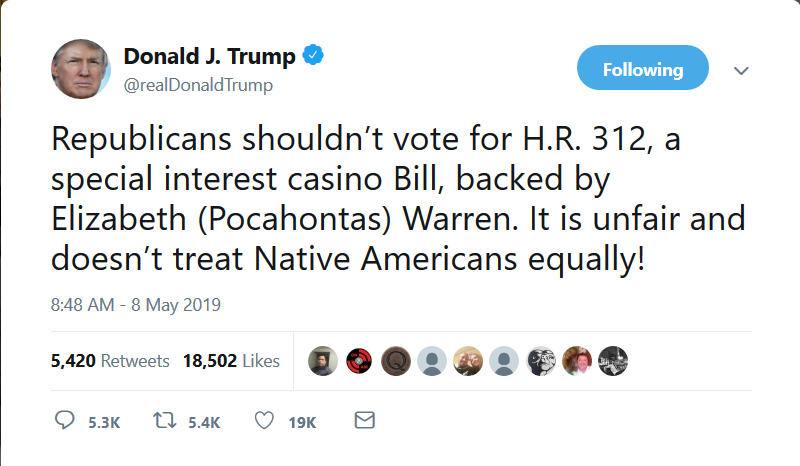The President tweeted out this morning a call to his fellow Republicans to oppose H.R. 312, the “Mashpee Wampanoag Tribe Reservation Reaffirmation Act.”

This is rich. Six Republicans have co-sponsored the bi-partisan bill.
INDIANZ.COM offered a useful summary of the legislation:
The bill was introduced to resolve questions about the tribe’s ability to restore homelands through the land-into-trust process. Congress enacted a similar law in 2014 and did the same in 2018 to clear up doubts that have arisen as a result of the U.S. Supreme Court decision in Carcieri v. Salazar.According to the ruling, a tribe can only go through the land-into-trust process if it was “under federal jurisdiction” in 1934. The Mashpee didn’t gain recognition of their status until 2007, well after the cut-off date
But the Bureau of Indian Affairs, during the Obama administration, concluded that Carcieri wasn’t a hindrance to the tribe because its citizens were living on a reservation in 1934. The Trump administration has since reversed course in response to litigation filed by opponents of a planned casino in the city of Taunton, only about 20 miles from an existing casino across the border in Rhode Island.
The reservation, however, remains in trust at this point. The BIA has confirmed that it lacks a mechanism to take a tribe’s land out of trust, something that hasn’t happened since the disastrous termination era.
The Trump administration had proposed regulations that would have provided such a mechanism. Due to tribal opposition, the newly confirmed head of the Department of the Interior has said the BIA won’t move forward with the changes.
Why on earth would the President claim that this legislation is unfair, and does not treat Indians equally? Because, conceivably, the Mashpee Wampanoags could engage in gaming, should they follow the processes spelled out the Indian Gaming Regulatory Act.
Too many people view gaming as an unfair privilege possessed by Native American peoples. They view gaming as one of a number of “special rights” Indians possess that other Americans do not. Trump either wants those who read his tweet to think that Senator Warren is pushing legislation that discriminates against native peoples, or he is lamenting that native peoples have unfair advantages that allow them to compete all-too-successfully with his seedy gaming enterprises. Nobody familiar with Trump’s history will be surprised to learn that the latter option is what fueled his angry tweet.
Native American tribes have something called inherent sovereignty. It is a concept that is described at length in Native America. Because native peoples belong to polities that predated the creation of the United States, under the American constituitonalism they have some of the attributes of sovereign nations. Essentially, Native American tribes can do whatever they want as governments unless they have explicitly lost that right as the result of a treaty or an act of Congress, or because the power in question is somehow inconsistent with their status as “domestic dependent nations.” Gaming, the Supreme Court held in the late 1980s, was a right that native communities retained under their inherent sovereignty, and the Indian Gaming Regulatory Act, which soon followed, limited the tribe’s ability to exercise that right.
The Mashpee Wampanoags want this bill, and their supporters across Indian country agree. You can read the statement tribal chairman Cedric Cromwell here. Donald Trump has trampled upon so many constitutional norms. Let’s call him out for each and every lie.
